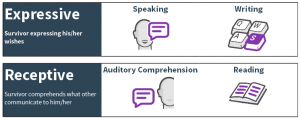Expressive Language
It is the caliber of a person to express themselves by using words sentences and vocabulary.
Receptive Language
A person can comprehend what is said by another person.
If you need more information or you have a question regarding Expressive and Receptive Language, you can discuss it with our HearingSol healthcare professionals, just give us a call on +91-9327901950. We are always here to help you.
Language Disorders
A language disorder is of two types one is expressive and another one is a receptive language disorder
Expressive Language Disorder
An expressive language disorder is a problem in expressing your thoughts to another person. This involves communicating verbally or through signs and motions.
The person with this condition can regularly comprehend what others say to them and can pronounce words. Their trouble lies in making discussion.
This can present in different ways:
- Limited Vocabulary: In this person does not use a specific name or noun. the person depends on terms like “that”, “things”. The person struggles in expressing their points in their own words.
- Grammar Challenges: In this person doesn`t know how to use tenses and articles. It generally happens in adulthood.
- Modulation and Intonation: In this person lacks in vocabulary as well as in meaning also. They use gestures rather than using words.
- Relationship difficulties: As most of the relationship depends on communication. The person with an expressive disorder mostly quiet and struggle in bonding with others.
Causes Expressive Language Disorders
Cause for language disorder, such as trauma or illness.
However, the causes of a particular person are not easily comprehended. Genetic factors and even poor nutrition could be possible reasons.
Language therapy is available treatment. Depending on the condition, treatment varies. But most of them obtain improvements through it.
Receptive Language Disorder
A receptive language disorder is an issue in which a person is unable to comprehend the speech of others.
The following ways that they have difficulties:
- Tuning Out: The person with disorder never participates in conversations or speech. If there are present and asked questions, they find difficult to respond.
- Not Following Through: People facing this type of disorder have difficulty in verbal instructions. Sometimes they respond small part of instructions only.
- Challenges to Tuning: In this people face difficulty in responding. Background noise and a group of people make more difficult for them to retain information.
- Communication Challenges: In this type of disorder people face difficulty to express themselves. They use limited words, gestures, facial expressions, and body language while speaking.
Common causes include:
- Impaired hearing — Difficult to catch what is being said
- Impaired vision — Body language and facial expressions are lacking.
- Attention disorders — Concentration is a challenge
Hope, you have learned about the difference between expressive and receptive language.
